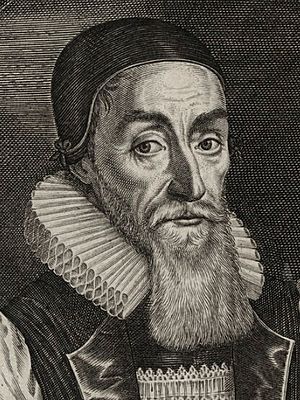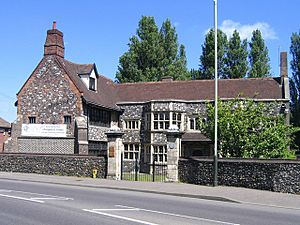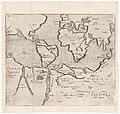Joseph Hall (bishop) facts for kids
Quick facts for kids Joseph Hall |
|
|---|---|
| Bishop of Norwich | |

Detail of an engraving by John Payne (1628)
|
|
| Diocese | Diocese of Norwich |
| Appointed | 1641 |
| Reign ended | 1646 |
| Predecessor | Richard Montagu |
| Successor | Episcopacy abolished |
| Personal details | |
| Born | 1 July 1574 Prestop Park, Leicestershire, England |
| Died | 8 September 1656 (aged 82) Heigham, near Norwich |
| Buried | Norwich Cathedral |
| Nationality | English |
| Spouse | Elizabeth Bambridge |
| Children | Six |
| Previous post | Bishop of Exeter (1627–1641) |
| Alma mater | Emmanuel College, Cambridge |
Joseph Hall (born 1 July 1574 – died 8 September 1656) was an important English bishop. He was also known for his funny and critical writings (a satirist) and for teaching good morals (a moralist). During his time, people knew him as a writer of religious books and as someone who often took part in big arguments about church matters in the early 1640s. In church politics, he usually tried to find a middle ground between different groups.
Contents
Early Life and Education
Joseph Hall was born on 1 July 1574, in a place called Bristow Park, near Ashby-de-la-Zouch, England. His father, John Hall, worked for a powerful nobleman, the Earl of Huntingdon. His mother, Winifred Bambridge, was a very strict Puritan.
When Joseph was 15, a religious teacher offered to train him for the church. However, a family friend suggested he go to Emmanuel College, Cambridge, instead. So, in 1589, Joseph went to Cambridge University. His uncle helped pay for his studies. He was a very good student and became a scholar and then a fellow (a senior member) at Emmanuel College in 1595. He earned his first degree in 1592 and his master's degree in 1596. He was known at the university for being very smart and a good speaker.
Becoming a Priest
After finishing his studies, Joseph Hall became a priest. He was offered a job as a headmaster at a school, but he chose to become a priest in a small town called Hawstead, Suffolk, in 1601. Life there was a bit tough at first. He had to fix up his house, and he felt his boss didn't pay him enough.
In 1603, he married Elizabeth Wynniff. Two years later, in 1605, he traveled outside England for the first time. He went with a diplomat to Spa, to learn about the Roman Catholic Church. In Brussels, he even had a debate with Jesuit priests about whether modern miracles were real.
Hall's religious writings caught the attention of Prince Henry, who was the king's son. Prince Henry made Hall one of his personal chaplains (religious advisors) in 1608. In 1613, Hall gave an important speech for King James's tenth year as king.
In 1612, he became a priest in Waltham-Holy-Cross, Essex, and also earned a higher degree (D.D.). He later received other church positions. In 1616, he went to France with a diplomat but had to return because he got sick. While he was away, the king made him the Dean of Worcester, which is a high position in a cathedral. In 1617, he went with King James to Scotland to support the king's ideas about church ceremonies.
In 1618, Hall was chosen to represent England at an important meeting of church leaders called the Synod of Dort. However, he became ill and had to leave.
Church Career in Exeter and Norwich
In 1627, Joseph Hall became the Bishop of Exeter. Even though he had strong beliefs that were similar to Calvinism, he believed that the Church of England should still respect the Roman Catholic Church, even if it disagreed with some of its practices. This idea was liked by King Charles I and his church advisors.
However, the Archbishop of Canterbury, William Laud, sent people to spy on Hall's church area. Laud thought Hall was too easy on Puritan priests. Over time, Hall found himself disagreeing with both Archbishop Laud's strict rules and the ideas of the Presbyterians, who wanted to change the church even more. He tried to find a peaceful way forward for the church.
In 1641, Hall was moved to become the Bishop of Norwich. In the same year, he was part of a special committee in the House of Lords that looked at religious matters. On December 30, 1641, he and other bishops were accused of high treason by the House of Commons. They were found guilty of a lesser crime and lost their church property, though they received a small amount of money to live on. They were held in the Tower of London for several months before being released on bail.
Later Life and Retirement

After being released, Hall went to his new church area in Norwich. For a while, he received money from the church. But in 1643, during the English Civil War, his property was taken away because he was seen as an enemy of Parliament. He was officially removed from his position as bishop on 9 October 1646, because the Parliament decided to get rid of bishops during the time of the Commonwealth.
Hall and his wife had trouble getting the money they were supposed to receive. They were eventually forced out of their home, and the cathedral was damaged. Hall wrote about how the church was ruined, describing "what clattering of glasses and beating down of walls!" and how soldiers drank and smoked inside the damaged cathedral.
Hall moved to a small village called Heigham, which is now part of Norwich. He spent his last thirteen years there, preaching and writing. He faced many problems and was often sick, but he handled everything with patience. He passed away on 8 September 1656. A famous doctor, Thomas Browne, looked after him in his old age and wrote that Hall was a "person of singular humility, patience and piety."
Joseph Hall's Writings
Joseph Hall wrote many different kinds of books and poems. When he was young, he wrote funny and critical poems. Later, he wrote to defend the role of bishops in the church. He also wrote many religious books that helped people think about their faith.
Satire and Poetry
When he was at Cambridge, Hall wrote a book of satires called Virgidemiarum (1597). Satires are writings that use humor, irony, or exaggeration to criticize people's foolishness or vices. He claimed to be the first English writer of satires, which upset another writer named John Marston.
During the late years of Queen Elizabeth I's rule, there were many satirical writings. Some people thought these writings attacked important institutions. The Archbishop of Canterbury even ordered that Hall's satires, along with other writers' works, should be burned. However, Hall's book was saved.
Hall wrote his satires in smooth, rhyming lines. In his first book, he criticized writers who wrote about inappropriate topics, overly dramatic plays, and poets who wrote strange verses. He also created funny descriptions of different types of people, like a chaplain who was also a tutor and servant in a country house.
After becoming a priest, Hall stopped writing verse satires and lighter forms of literature.
Mundus alter et idem
Hall is also believed to have written a satirical novel called Mundus alter et idem (around 1605 or 1607). This book describes a fictional, strange land and includes some criticism of the Roman Catholic Church.
Religious Writings
Hall wrote many books to help people in their faith. Some of his well-known religious works include:
- Holy Observations Lib. I (1607)
- Three Centuries of Meditations and Vowes, Divine and Morall (1606-1609)
- The Arte of Divine Meditation (1607)
- Contemplations on the Historical Passages of the Old and New Testaments (1614)
- Heaven upon Earth, or of True Peace and Tranquillitie of Mind (1606)
- Occasional Meditations (1630)
- The Devout Soul; or Rules of Heavenly Devotion (1644)
Autobiographical Writings
Hall also wrote about his own life. His autobiographical writings include Observations of some Specialities of Divine Providence in the Life of Joseph Hall, Bishop of Norwich and Hard Measure. These writings give us a good look into his experiences.
Family Life
In 1603, Joseph Hall married Elizabeth Winiffe. They had six sons and two daughters. Several of his sons also became important church figures. His eldest son, Robert, became a Canon of Exeter Cathedral. His third son, George, became the bishop of Chester.
Images for kids
 | Aurelia Browder |
 | Nannie Helen Burroughs |
 | Michelle Alexander |



